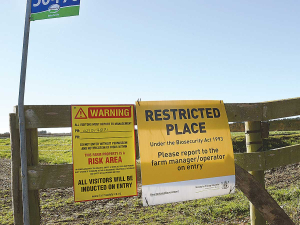DairyNZ Calls for Changes to Government’s Proposed Resource Management Act Reform
DairyNZ says the Government’s proposed Resource Management Act reform needs further work to ensure it delivers on its intent.
 With the transition of the Mycoplasma bovis programme to a National Pest Management Plan, the number of biosecurity levies farmers pay will increase to seven.
With the transition of the Mycoplasma bovis programme to a National Pest Management Plan, the number of biosecurity levies farmers pay will increase to seven.
In its submission on proposed amendments to the Biosecurity Act, DairyNZ says its levy-paying members invested more than $60 million across the biosecurity system last year, through multiple biosecurity levies across several entities and legislative frameworks to collect this funding.
It points out that this adds unnecessary complexity, administrative cost and a lack of transparency with levy investment in biosecurity for farmers.
"We would like to see a more integrated and sustainably funded biosecurity system for the livestock sector that minimises risks through collective readiness and good biosecurity practices," it says.
"To support this, our farmers need certainty and consistency of the principles that will be applied to risk management, cost-sharing, and decision-making across the biosecurity system."
It also notes that delivery of services within the biosecurity system is fragmented, with inconsistent legislative and system settings to support effective funding and delivery.
"Different programmes often have the same stakeholders involved and this contributes to the frustration experienced by dairy farmers about regulatory burden and lack of transparency of levy investment."
DairyNZ notes that farmers currently fund the biosecurity system through six different levies and with the transition of the Mycoplasma bovis programme to a National Pest Management Plan (NPMP), this increases to seven.
"Dairy farmers may also contribute further funding to the biosecurity system when cattle are designated as beef cattle for slaughter and on the purchase of seed for arable crops."
It recommends that biosecurity levies consolidated into a single levy (or fewer levies) with the creation of a cross-industry organisation that integrates the deliver, and funding, of biosecurity services would be a more efficient way to recover costs and lessen administrative expense for industry and government.
OPINION: "We are back to where we were a year ago," according to a leading banking analyst in the UK, referring to US president Donald Trump's latest imposition of a global 10% tariff on all exports into the US.
DairyNZ says the Government’s proposed Resource Management Act reform needs further work to ensure it delivers on its intent.
Overseas Trade Minister Todd McClay says he's working constructively with the Labour Party in the hope they will endorse the free trade agreement (FTA) with India when the agreement comes before Parliament for ratification.
Donald Trump's latest tariff tantrum has again thrown the world of trade into a new round of turmoil and uncertainty, and NZ is caught up in it.
The third edition of the NZ Dairy Expo, held in mid-February in Matamata, has shown that the KISS principle (keep it simple stupid) was getting a positive response from exhibitors and visitors alike.
Twenty years ago, South African dairy farm manager Louis Vandenberg was sent to a farm in Waikato to provide training on Afimilk technology.

OPINION: A mate of yours truly reckons rural Manawatu families are the latest to suffer under what he calls the…
OPINION: If old Winston Peters thinks building trade relations with new nations, such as India, isn't a necessary investment in…